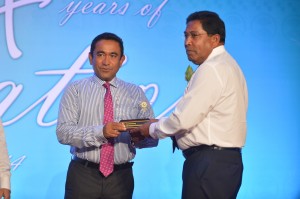President Abdulla Yameen has denied politically motivated targeting of Jumhooree Party (JP) Leader Gasim Ibrahim’s business interests.
While an agreement with Gasim’s Villa Air to manage and develop the Kaadehdhoo airport was terminated due to failure to maintain safety standards, Yameen said the government decided not to renew the lease of Laamu Baresdhoo because agricultural work was not done on the island in accordance with the agreement.
“So even if it is the biggest businessman in the Maldives or anyone else, he will be equal before the government in upholding rules,” Yameen told reporters prior to departing to China on Thursday night (August 14).
Baresdhoo had been leased for 21 years, he noted, but “no work has been done there.”
“Baresdhoo is a huge island. If it had been taken for the tourism industry instead of being leased for agricultural work, millions of dollars would have been made,” Yameen said.
The government had formulated “sound” rules for leasing uninhabited islands during Ramadan, he explained, which stipulates that islands would be reclaimed if the purpose for which it was leased was not being fulfilled.
In the case of the Laamu atoll airport, Yameen said Villa did not maintain safety standards or take corrective measures within a specified period.
When safety measures are not taken, “it is the Civil Aviation Authority that has to bear responsibility for any problems that arise, isn’t it?”
“Exceptions” could not be made for violations of regulations, the president said.
The decisions were not intended to “impede” or hinder Gasim’s businesses, he insisted.
Yameen went on to say that there were islands leased for tourism development where no work has been done for eight to ten years.
The islands were leased to create job opportunities for people of nearby inhabited islands and generate tax revenue for the government, he said.
The moves by the government followed stringent criticism from the business tycoon of the government’s flagship special economic zone (SEZ) legislation at Wednesday’s sitting of parliament.
After boycotting the committee reviewing the legislation, Gasim warned that an SEZ law would facilitate massive corruption, threaten independence, and authorise a board formed by the president “to sell off the entire country in the name of economic zones.”
Threats to sue
 In addition to the decisions concerning the Kaadehdhoo airport and Baresdhoo, local media reported that the fisheries ministry has given a 30-day notice to Gasim’s Horizon Fisheries Pvt Ltd to hand over a leased plot of land in Gaaf Dhaal Hoadehdhoo.
In addition to the decisions concerning the Kaadehdhoo airport and Baresdhoo, local media reported that the fisheries ministry has given a 30-day notice to Gasim’s Horizon Fisheries Pvt Ltd to hand over a leased plot of land in Gaaf Dhaal Hoadehdhoo.
A letter informing the company of the decision – shared with local media – stated that Horizon had failed to complete work on a 3,000 metric ton cold storage unit, a factory, a harbour and a jetty in accordance with the lease agreement.
Moreover, the company had not begun work on a refrigeration system, ice plant, laboratory, fuel storage unit, water tank and an RSW vessel, the letter stated.
The company was told that the lease agreement would be terminated if corrective measures were not taken.
Meanwhile, in a press release on Thursday, the regional airports department under the tourism industry revealed that the decision to terminate the Kaadehdhoo agreement was made because Villa had failed to maintain standards mandated by the Civil Aviation Authority.
The Kaadehdhoo airport had been leased under a public-private partnership (PPP) project as its operation and development was a financial burden on the state budget, the press release explained.
However, deteriorating quality of service and lack of development defeats “the PPP’s purpose,” it added.
The agreement with Villa Air to operate the airport for a period of 50 years was signed during the final days of former President Dr Mohamed Waheed’s administration.
Former Transport Minister Dr Ahmed Shamheed – filling a JP slot in cabinet at the time – was sacked in November 2012 after extending the lease of the privately-owned airport in Maamigili for 99 years.
Despite the dismissal, the decision was not reversed and JP Deputy Leader Ameen Ibrahim, who signed the Kaadehdhoo agreement on behalf of the government on November 6, replaced Shamheed.
In June this year, President Yameen abolished the Ministry of Transport and Communication after dismissing Ameen – in the wake of the ruling Progressive Party of Maldives severing its coalition agreement with Gasim’s JP – and transferred both the Civil Aviation Authority and regional airports to the Ministry of Tourism.
In July, following threats by the JP to sue two of its MPs for switching to the PPM, Tourism Minister Ahmed Adeeb – also deputy leader of PPM – told newspaper Haveeru that the government was looking into cases where Gasim could be sued.

